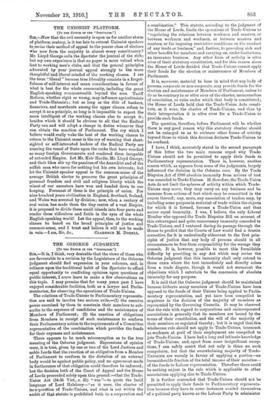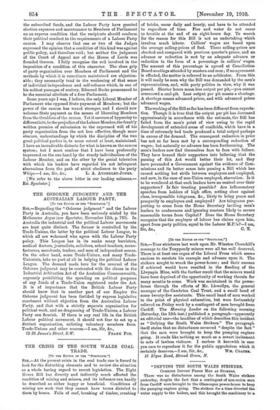tr.am OSBORNE JUDGMENT.
[To THE EDITOR OF THE " SPECTATOR."] Sin, —It is, I think, very desirable that the views of those who are favourable to a revision by the Legislature of the Osborne judgment should find expression in your columns, and, in reliance upon the traditional habit of the Spectator to afford equal opportunity to conflicting opinions upon questions of public interest, I crave leave to make a few observations on this topic. I may premise that for many years past I have enjoyed considerable facilities, both as a lawyer and Parlia- mentarian, for observing the operations of Trade-Unions.
The relations of Trade-Unions to Parliamentary representa- tion are said to involve two serious evils,—(1) the coercive power exercised by them to constrain their members to sub- scribe to the expenses of candidates and the maintenance of Members of Parliament ; (2) the exaction of obligations from Members in receipt of such maintenance to conform their Parliamentary action to the requirements of a Committee representative of the combination which provides the funds for their expenses and maintenance.
There appeals to be much misconception as to the true meaning of the Osborne judgment. Expressions of opinion were, it is true, given by one or two of the Lord Justices and noble Lords that the exaction of an obligation from a Member of Parliament to conform to the dictation of an external body would be against public policy, and no agreement made in furtherance of that obligation could therefore be enforced; but the decision both of the Court of Appeal and the House of Lords proceeded solely upon this ground :—that the Trade- Union Act (34-35 Vict., c. 31) " was "—to quote the lucid language of Lord Halsbury—" as it were, the charter of incorporation of Trade-Unions, and what is not within the ambit of that statute is prohibited both to a corporation and a combination." This statute, according to the judgment of the House of Lords, limits the operations of Trade-Unions to "regulating the relations between workmen and masters, or between workmen and workmen, or between masters and masters, or for imposing restrictive conditions on the conduct of any trade or business," and, further, to providing sick and other benefits for members and carrying on, under limitations, an insurance business. Any other form of activity is ultra wires of their statutory constitution, and for this reason alone the House of Lords decided that Trade-Unions cannot apply their funds for the election or maintenance of Members of Parliament.
It is, moreover, Material to bear in mind that any body of persons, corporate or non-corporate, may provide funds for the election and maintenance of Members of Parliament, unless to do so be contrary to or ultra sires of the charter, memorandum of association, or rules under which that body is constituted ; the House of Lords held that the Trade-Union Acts consti- tute, as it were, the charter of Trade-Unions, and thus by their interpretation it is ultra virea for a Trade-Union to provide such funds.
The question, therefore, before Parliament will be whether there is any good reason why this statutory charter should not be enlarged as as to embrace other forms of activity beyond those to which this decision declares Trade-Unions to be confined.
I have, I think, accurately stated in the second paragraph of this letter the two main reasons urged why Trade- Unions should not be permitted to apply their funds to Parliamentary representation. There is, however, another reason which, as appears from some of the judgments, largely influenced the decision in the Osborne case. By the Trade Disputes Act of 1906 absolute immunity from actions of tort was conceded to Trade-Unions. If, therefore, the Trade-Union Acts do not limit the spheres of activity within which Trade- Unions may move, they may carry on any business and be immune from actions of tort which may be committed in the course thereof ; nay, more, any association of traders may, by including some purpose in restraint of trade within the objects for which it is formed, become a. Trade-Union and thus secure equal immunity. I was, I believe, the only Liberal Member who opposed the Trade Disputes Bill on account of this extravagant and quite unnecessary immunity conceded to Trade-Unions, and I ventured during its passage through the House to predict that the Courts of Law would find a drastic corrective, for it is undoubtedly abhorrent to the first prin- ciples of justice that any body of persons should in all circumstances be free from responsibility for the wrongs they commit. It is, however, possible to meet this formidable difficulty by providing in any Act which may revise the Osborne judgment that this immunity shall only extend to those cases where the tort immediately and directly arises from a trade dispute, though it would not surmount the objections which I entertain to the concession of absolute immunity for any purpose.
It is said that the Osborne judgment should be maintained because hitherto many members of Trade-Unions have been opposed to the funds of their Unions being applied to Parlia- mentary representation, and yet have been compelled to acquiesce in the decision of the majority of members as represented by the Governing Councils. It may be observed that the rule with regard to corporations and unincorporated associations is generally that its members are bound by the terms of their constitution, and the will of the majority of their members as regulated thereby; but it is urged that this wholesome rule should not apply to Trade-Unions, inasmuch as workmen at peril of their employment are compelled to join Trade-Unions. I have had a long and intimate knowledge of Trade-Unions, and, apart from some insignificant excep- tions, I can safely assert that not only is there no such compulsion, but that the overwhelming majority of Trade- Unionists are warmly in favour of applying a portion—an inconsiderable fraction of the total income of their societies— of the funds to Labour representation. Therefore there could be nothing unjust in the rule which is applicable to other associations applying also to Trade-Unions.
It is further contended that Trade-Unions should not be permitted to apply their funds to Parliamentary representa- tion because they have in some instances availed themselves of a political party known as the Labour Party to administer
the subscribed funds, and the Labour Party have granted election expenses and maintenance to Members of Parliament on an express condition that the recipients should conform their political conduct to the requirements of a Labour Party caucus. I may observe that one or two of the Judges expressed the opinion that a condition of this kind was against public policy, and therefore void ; but neither the judgment of the Court of Appeal nor of the House of Lords was founded thereon. I fully recognise the evil involved in the imposition of a condition of this character. The close grip of party organisation over Members of Parliament and the methods by which it is sometimes maintained are objection- able ; they necessarily tend to the weakening of that sense of individual independence and self-reliance which, in one of his noblest passages of oratory, Edmund Burke pronounced to be the essential attribute of a free Parliament.
Some years ago I was, I believe, the only Liberal Member of Parliament who opposed State payment of Members ; but the power of the caucus has waxed stronger, and I should now welcome State payment as the means of liberating Members from the thraldom of the caucus. Yet it savours of hypocrisy to differentiate, to the prejudice of the Labour Member, the frankly written promise of submission to the expressed will of his party organisation from the not lees effective, though more obscure, understandings by which the discipline of the two great political parties is, to some extent at least, maintained. I have an ineradicable distaste for what is blown as the caucus system ; but I must confess that I have been profoundly impressed on the one hand by the sturdy individualism of the Labour Member, and on the other by the genial toleration with which his leaders have regarded his not infrequent aberrations from the path of strict obedience to the party
Whips.—I am, Sir, &c., L. A. ATHERLEY-JONES. [We refer to the above letter in our leading columns.— ED. Spectator.]



































































 Previous page
Previous page